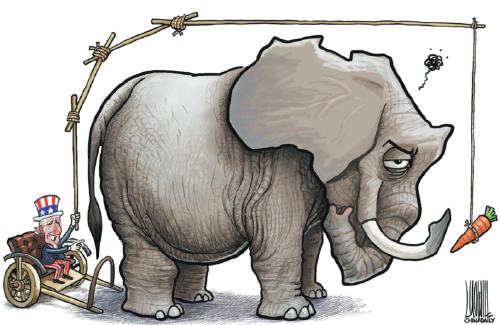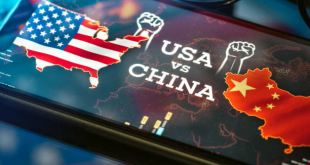Published: August 26,2022
By LI WENTAO

LUO JIE/CHINA DAILY
Despite the US saying it will not make the continent choose sides, its new strategy includes many items targeting Russia and China
The Joe Biden administration has unleashed a diplomatic offensive for Africa in the run-up to the US-Africa summit to be held at the end of this year. US Secretary of State Antony Blinken visited South Africa, the Democratic Republic of the Congo and Rwanda on Aug 8-12. During his visit to South Africa, Blinken delivered a speech on the Biden administration’s new strategy for sub-Saharan Africa.
After launching its policies for the Asia-Pacific and “Indo-Pacific regions”, the United States has started laying out its strategy for other regions. This year, it held a summit with the Association of Southeast Asian Nations in May and the Summit of the Americas in June. In July, Biden made his first trip to the Middle East as president and in August shifted his diplomatic focus to Africa, which is considered “the last piece of the puzzle” in the Biden administration’s regional strategy.
Over the past decade, the US government has issued three strategies on Africa-under the Obama administration in 2012, the Trump administration in 2018 and now the Biden administration. Compared with the strategies of the previous two administrations, the Biden administration’s strategy is more comprehensive.
The new US strategy for Africa proposes four key objectives: developing an open society, boosting democracy and security, promoting a post-pandemic recovery and economic development, and supporting ecological protection to address climate change and energy transition in Africa.
The Biden administration’s policies on Africa show that the US is gradually incorporating Africa into its global strategic framework such as “Build Back Better World” and “Partnership for Global Infrastructure and Investment”. The new US strategy also proposes to include African countries in the US’ “Indo-Pacific Strategy”.The US aims to connect Africa more closely with its global geostrategy and show the importance it attaches to Africa without the need of designing specific policies.
The US is also attempting to promote its values in diplomacy, targeting “authoritarian” countries in Africa. The Biden administration has been selling US values and systems to the world, especially to developing countries such as those in Africa. The “open societies” theory divides the world into “open” and “closed” camps, which encourages confrontation.
The US is introducing “small circles” into Africa. The unilateralism and “America First” strategies of the Trump administration were widely criticized around the world. After Biden took office, he spoke of multilateralism while actually developing exclusive cliques in some regions. The Minerals Security Partnership promoted by the US in June focuses on Africa’s key strategic mineral resources, which has become an exclusive supply chain alliance. The new strategy mentions several times that it will work with European and Indo-Pacific allies to promote “high-level” investment in Africa, which implies creating a “small circle “that promotes democracy and security in Africa.
On the issue of relations between major powers in Africa, the new strategy portrays China and Russia as major threats and the biggest strategic competitors in Africa, and seeks to smear them.
According to US’ new strategy, it will reframe the importance of Africa to US national security interests, and provide more aid and support to Africa. However, in effect the US’ approach toward Africa may not see substantial changes, and US-Africa relations will not improve remarkably given US practices and the content of its strategy.
One reason is that the US has not changed the hegemonic thinking toward Africa. The Biden administration said that it will develop an equal partnership with Africa, but it continues with interventions and sanctions. Despite recent calls by African countries to lift the sanctions on Zimbabwe, the US has made no move. To intervene in the situation in Ethiopia, the US removed Ethiopia from the African Growth and Opportunity Act in January, which severely affected the Ethiopian textile industry, leading tens of thousands of Ethiopian workers to lose their jobs.
While US government officials and documents stress showing respect to Africa, the US’ attitude toward Africa is condescending. The new strategy quotes data from an NGO that only eight of the 54 African countries are democracies, completely ignoring the achievements African countries have made in independent development over the past years.
The US has made many promises to Africa. In the new strategy, it pledges to increase investment in infrastructure, climate change, agricultural development and the digital economy in Africa. However, no specific plan, amount of funds or schedule is introduced. The US proposed the “Build Back Better World” initiative in 2021, promising to invest $40 trillion in developing countries by 2035. But African countries have not enjoyed any benefits from the initiative over the past year. The US also proposed the “Power Africa” initiative, promising to invest in 20,000 megawatts of electricity in Africa by 2020, but the actual power generation was less than one-quarter of the promised amount.
The US still intends to play a geopolitical zero-sum game in Africa. Blinken said during his visit to Africa that the US does not view Africa as the “latest playing field in a competition between great powers” and will not make Africa choose sides. However, the new US strategy includes many items targeting Russia and China.
The author is executive director and a research professor at the Institute of African Studies at the China Institutes of Contemporary International Relations.
China Daily Global
 Africa -China Review Africa -China Cooperation and Transformation
Africa -China Review Africa -China Cooperation and Transformation
